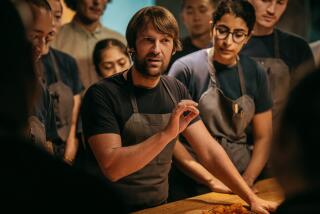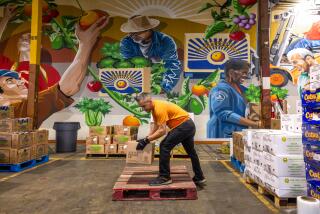One fix for our broken food supply chain? A skin that keeps avocados fresher for longer
- Share via
Bookend images from recent weeks tell the story of America’s flawed food system. Image one: Farms with rows of produce — lettuce, tomatoes, squash — left rotting in the sun, unable to find a market. Image two: Cars lined up for a mile or more awaiting their turn to pick up free groceries from a food pantry.
Food waste in the U.S. isn’t a new phenomenon, but the coronavirus outbreak and its consequences have made it hard to ignore. About 35% to 40% of food ends up as garbage, with the biggest chunk of that happening in the home. Yet 37 million Americans experienced food insecurity in 2018, and that number appears set to soar with surging unemployment.
It was this dichotomy that inspired James Rogers, then a PhD student in materials science at UC Santa Barbara, to start Apeel Sciences in 2010. “The problem isn’t production, it’s amortization of supply,” he says. “The food system right now is really great for people who can participate. But there are a lot of people who aren’t participating.”
Applied to the surface of fruits and vegetables, Apeel’s products act as a sort of second skin, doubling or tripling shelf life, driving down spoilage rates for supermarkets and, for shoppers, taking some of the guesswork out of buying finicky foods such as avocados and peaches.
On Tuesday, the Santa Barbara-based company announced raising $250 million in new venture capital. Led by GIC, which manages investments for Singapore’s government, the new funding round values the company at just over $1 billion and includes participation from local residents Oprah Winfrey and Katy Perry. Perry, who is also an investor in the alternative protein startup Impossible Foods, declined to disclose the size of her stake but called it “the most substantial financial investment I’ve ever made in a company.”
The sudden economic downturn brought about by coronavirus lockdowns has meant a chillier funding environment for startups, causing many to resort to layoffs. Apeel benefits from having as its customers supermarkets, which have been notching record sales as Americans shift to preparing most of their meals at home.
But that shift in consumption has brought new challenges. Grocery stores generally don’t profit on produce, regarding it as a loss leader to get shoppers into the store. As the number of weekly grocery store trips per household has plunged from 2.3 to 1, shoppers began filling their carts differently, buying in bulk and preferring foods that will keep longer. “For a grocer who’s basing purchases on what you purchased the same time last year, it challenging to manage that inventory,” Rogers said.
Meanwhile, the shutdown of corporate and school cafeterias and many hotels and restaurants has disrupted the pipeline from farm to plate, causing produce to pile up for want of distribution. “With half of the food system getting shut off practically overnight, what we’ve seen is a lot of waste driven up to the farm level,” said Dana Gunders, executive director of ReFED, a nonprofit that works to reduce food waste. “One of the real bottlenecks we’re seeing is in cold storage. We’re hearing from food banks they can’t take any more produce or perishables because their coolers are full.”
Apeel’s solution to all this is to slow down the clock. Like other living things, fruits and vegetables breathe. It’s this exchange of oxygen and carbon dioxide, and the concurrent loss of moisture, that causes them to ripen and rot. Refrigeration slows respiration but accelerates moisture loss; upping the humidity to compensate promotes the growth of mold. “You’re always fighting a battle of time,” said Walter Robb, the former co-CEO of Whole Foods who has been on Apeel’s board of directors since 2018.
Searching for a way to slow that process, Rogers, who earned his undergraduate degree at Carnegie Mellon University in Pittsburgh, thought of the way a thin chemical layer keeps stainless steel from rusting. He thought he could do something like that, until his Santa Barbara friends pointed out no one who spends $6 for organic strawberries wants them treated with chemicals.
The solution he hit on was to make the layer out of molecular components derived from discarded skins of the same fruits and vegetables. “Philosophically, people don’t think of food as chemicals,” he said. A microscopically thin film is all it takes to preserve an internal microclimate that allows fruit and vegetables to stay alive without aging prematurely. Using food as its only ingredient allows Apeel to market the treatment as organic, carrying a generally regarded as safe, or GRAS, designation from the Food and Drug Administration.
“The orange already has the perfect wrapper. We don’t need to go into the lab to solve that problem,” Rogers said.
Rogers developed the idea with early support from L.A.’s Upfront Ventures and a $100,000 grant from the Bill & Melinda Gates Foundation, which was looking for ways smallholder farmers in Africa could get their crops to market without refrigeration. In 2016, at Upfront’s suggestion, he sent two flats of green avocados to the offices of Andreessen Horowitz, the influential San Francisco venture capital firm, with a sign saying, “Watch me.”
Over the next 14 days, the avocados in one box softened and blackened while those in the other box hit peak ripeness and stayed there. “It’s one thing to hear about it. It’s another thing to see it with your own eyes,” said Vijay Pande, who oversees the firm’s life sciences fund. Andreessen Horowitz ended up leading Apeel’s subsequent $33-million funding round.
In the U.S., Kroger supermarkets nationwide sell Apeel-treated avocados and some are testing asparagus and limes. In Europe, Germany’s largest supermarket chain, Edeka, carries Apeel mangoes and oranges. Because the stores save money on spoilage, they’re able to sell Apeel items for the same as or cheaper than the untreated equivalent, Rogers said. “You’re able to stock the shelves with less risk of the food going bad.”
For all those images of farmers pouring out milk and letting lettuces rot on the ground, it’s difficult to know for sure whether America is wasting more food during the pandemic, Gunders said. “We’re producing about the same amount of food, and people in theory are eating the same amount of food,” she said.
But food waste is one of those areas in which returning to “normal” after the virus recedes wouldn’t exactly seem like a victory anyway. The climate change nonprofit Project Drawdown has identified reducing it as a key driver of bringing down greenhouse gas emissions. Meanwhile, prolonging the shelf life of fruits and vegetables could help reduce poverty in the developing world, by connecting farmers to markets, and malnutrition in the U.S., by eliminating “food deserts.”
Perry, who was introduced to Rogers by Chris Lyons at Andreessen Horowitz, said she has been looking to get involved with start-ups that are “not taking but giving to the planet and humanity. I’m really interested in the magic of just moving the planet back in the right direction, or a better direction.”
She made the investment before the COVID-19 pandemic changed consumption habits, and now views it as that much better of a bet. “We’re all in this really observatory moment, as far as our food goes,” she said. “You see how long those fruits and vegetables last. We all know the price of milk now.”







